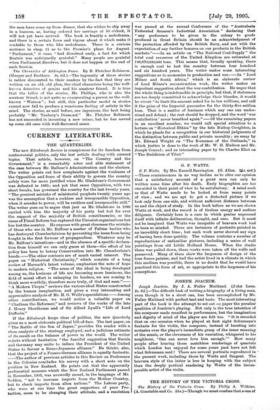THE QUARTERLIES.
C URRENT LITERAT U RE .
The new Edinburgh Review is conspicuous for its freedom from controversial politics, only the last article dealing with current
topics. That article, however, on "The Country and the Government," is a remarkably sober and able statement of the case between Mr. Balfour's Administration and the electors. The writer points out how complaints against the weakness of the Opposition and fears of their ability to govern the country safely were far more justified when Mr. Gladstone's Government was defeated in 1886; and yet that same Opposition, with two
short breaks, has governed the country for the last twenty years. "The greatest mistake of ministerial prophets twenty years ago was the assumption that a reckless and irresponsible Opposition, when it accedes to power, will be reckless and irresponsible still."
The writer goes on to argue that just as Mr. Gladstone in 1886 carried with him the majority of his party but lost for ever
the support of the majority of British constituencies, so the cause of Fiscal Reform has captured the Unionist organisations but has lost the country. He exposes with great clearness the mistake
of those who see in Mr. Balfour a master of Fabian tactics who
has destroyed Chamberlainism by preventing the issue from being fought in the first fervour of propagandism. Whatever may be Mr. Balfour's intentions—and in the absence of a specific declara- tion from himself we can only guess at them—the effect of his policy has been to betray Conservatism into Mr. Chamberlain's hands.—The other contents are of much varied interest. The paper on "Historical Christianity," which consists of a long review of Harnack's latest volume, emphasises the note of hope in modern religion. "The sense of the ideal is being developed among us, the horizons of life are becoming more luminous, the field of moral effort is enlarging its borders, we are coming to think more worthily, therefore more truly, of God and man."— " A Modern Utopia" reviews the various ideal States constructed by the human imagination, and gives a very interesting and appreciative analysis of Mr. H. G. Wells's speculations.—Among other contributions, we would notice a valuable paper on "Chatham the Reformer," and reviews of the works of the late J. Henry Shorthouse and of Sir Alfred Lyall's "Life of Lord Dufferin."
If the Edinburgh keeps clear of politics, the new Quarterly gives us a most elaborate political bill-of-fare. The last paper, on
"The Battle of the Sea of Japan," provides the reader with a close analysis of the strategy employed, and a judicious estimate of its result on the balance of power in the world. The writer rejects without hesitation "the fanciful suggestion that Russia and Germany may unite to induce the President of the United States to favour a Russo-Japanese alliance." He thinks, also, that the project of a Franco-German alliance is equally fantastic. —The author of previous articles in this Review on Preference in the Colonies concludes his survey with a short note on the position in New Zealand. He points out that the apparently preferential measure which the New Zealand Parliament passed in November, 1903, was avowedly meant, in the language of Mr. Seddon, "not to increase imports from the Mother Country, but to check imports from alien nations." The Labour party, who were at one time the great supporters of pure Pro- tection, seem to be changing their attitude, and a resolution
was passed at the annual Conference of the "Australasia Federated Seamen's Industrial Association" declaring that "any preference to be given in the colony to goods produced in Great Britain should be an acknowledgment of the protection afforded by the British Navy, and not with the expectation of any further bonuses on our products in the British markets."—In an article on "The National Coal-Supply" the total coal resources of the. United Kingdom are estimated at 146,870,000,000 tons. This means that, broadly speaking, there is enough coal to last the country between four hundred and six hundred years. The writer makes some interesting suggestions as to economies in production and use.—In "Lord Milner and South Africa," which is an elaborate review of Lord Milner's reconstruction work, the writer makes an important suggestion about the war contribution. He urges that the whole thing is indefensible in principle, but that, if statesmen are too deeply committed to acknowledge their blunder, it would. be wisest "to limit the amount asked for to ten millions, and call it the price of the Imperial guarantee for the thirty-five million loan. That is a matter of business which any one can under- stand and defend ; the rest should be dropped, and the word war contribution' never breathed again."—Of the remaining papers in an excellent number, we would call special attention to a lecture on "Historical Ethics" by the late Bishop Creighton, in which he pleads for a recognition in our historical judgments of the distinction between public and private morality ; an essay by Mr. Edward Wright on "The Romance of the Outlands," in which justice is done to the work of Mr. W. H. Hudson and Mr. Joseph Conrad ; and an interesting paper by Sir Charles Eliot on "The Buddhism of Tibet."






































 Previous page
Previous page